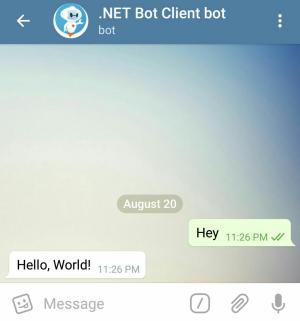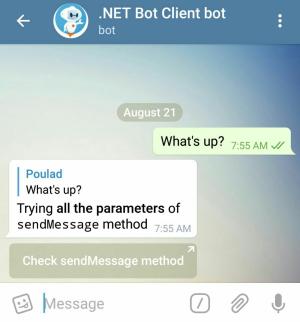Sending Messages
There are many different types of message that a bot can send, but let’s start with text messages.
Basic text message
await bot.SendMessage(chatId, "Hello, World!");

The chatId parameter would typically be the ID of a chat or a user that you obtained on a received message,
or it can be the @username of a public group/channel.
Advanced text message
You can send messages with more characteristics:
- text effects (using HTML, Markdown, or text entities)
- attached inline buttons
- as a reply to a message
- and more…
Important
We highly recommend you use HTML instead of Markdown because Markdown has lots of annoying aspects
The code snippet below sends a message using various parameters:
var message = await bot.SendMessage(chatId, "Trying <b>all the parameters</b> of <code>sendMessage</code> method",
ParseMode.Html,
protectContent: true,
replyParameters: update.Message.Id,
replyMarkup: new InlineKeyboardButton("Check sendMessage method", "https://core.telegram.org/bots/api#sendmessage"));

Here text is written in HTML format and parseMode indicates that.
By passing protectContent we prevent the message (and eventual media) to be copiable/forwardable elsewhere.
It’s a good idea to make it clear to a user the reason why the bot is sending this message and that’s why we pass the user’s
message id for replyParameters.
You have the option of specifying a replyMarkup when sending messages.
Reply markups are explained in details later in this book.
Here we used an Inline Keyboard Markup with a button that attaches to the message itself.
Clicking that opens sendMessage method documentation in the browser.
Observing the Message that just got sent
Almost all of the Send* methods return the message you just sent. Let’s have a look at this object. Add this statement after the previous code.
Console.WriteLine(
$"{message.From.FirstName} sent message {message.Id} " +
$"to chat {message.Chat.Id} at {message.Date}. " +
$"It is a reply to message {message.ReplyToMessage.Id} " +
$"and has {message.Entities.Length} message entities.");
Output should look similar to this:
Awesome bot sent message 123 to chat 123456789 at 8/21/18 11:25:09 AM. It is a reply to message 122 and has 2 message entities.
Try putting a breakpoint in the code to examine all the properties on a message objects you get.
There are a few things to note:
message.Dateis a timestamp in UTC format (usemessage.Date.ToLocalTime()to convert to your local timezone).message.Text: plain text without effectsmessage.Entities: list of text effects to be applied to the plain textmessage.EntityValues: text parts covered by these entities
You can use our extension methods message.ToHtml() or message.ToMarkdown() to convert the text & entities of a Message back into HTML (recommended) or Markdown.
More message types
Discover more message types in the next pages.

